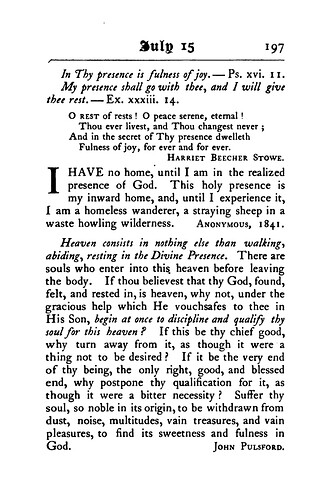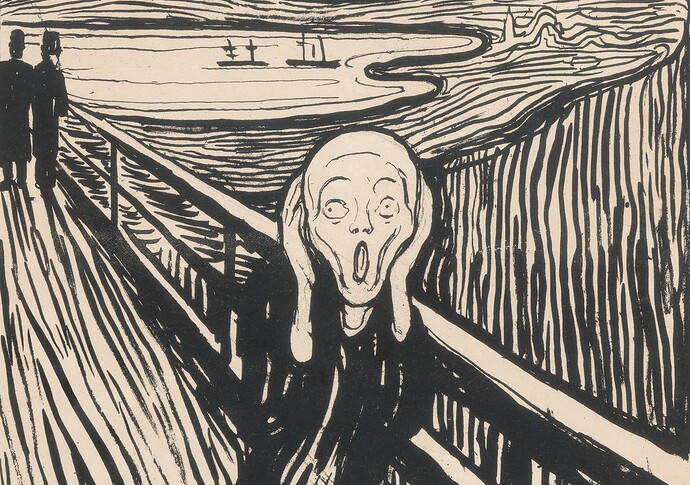Yes, that sounds like a great conversation! We don’t get to see that often enough.
And when or if you come around to reading Smith, I think his latest book is the best place to begin as it culminates his previous work and as with many writers expresses the most mature thinking on their life’s work.
One reviewer captures it well:
To Smith, we are liturgical animals “whose orientation to the world is shaped by rituals of ultimacy: our fundamental commitments are inscribed in us by ritual forces and elicit from us orienting commitments that have the epistemic status of belief”
I started the book, and not wanting to get too far ahead, it would be nice to read in a group.
So I started Penner’s book and so far I really like his tone and obvious learning.
The comparison between being down the rabbit hole or on the bridge of an intergalactic starship is perceptive. However, I would take it one step further, as the difficulty of interpreting our world is compounded by there being bits that are true of both worlds in this one.
What reason can and cannot determine about the world.
As far the enlightenment, whenever that word is mentioned, I enjoy remembering the sound of Ken Myers’ voice reading John Betz:
“The Enlightenment proposed a doctrine of reason that required no faith, a vision of society that required no tradition, and a politics that required no God, the source of all light and being.”
Definitely would love to hear smith and penner converse. I think they would have much to discuss in an expansive and edifying discussion.
Sounds like an important book.
So interesting to see Penner take Kierkegaard as the third way or synthesis between Nietzsche and Aristotle. I wonder what anyone of them, Penner included, would think about how reason tells there is an infinite being but not an infinite number of things. And I think Kierkegaard would especially like how the rational possibility of solipsism evidences our fallen nature. And also how the triune God would not have suffered being alone, until he became that in the person of Jesus Christ. Admittedly, there is a sharp divide (of opinion) in how the dual natures participate through his suffering.
For I am convinced that neither death nor life, neither angels nor demons, neither the present nor the future, nor any powers, neither height nor depth, nor anything else in all creation, will be able to separate us from the love of God that is in Christ Jesus our Lord.
I have no idea. I’m not sure that the book addresses these questions. They certainly are not questions I am in any way prepared to discuss.
If you are interested in working through the book and discussing it, I will set up a separate public thread, so we don’t clog up this thread with discussion, rather than quotes. I propose we set a schedule to keep the discussion on track. A chapter a week would give us time to be thorough in reading and consideration of what we find worth discussing. It would also give anyone who needs/wants it a chance to find definitions and background explanations.
Reading one book that references Kierkegaard and Rorty, plus Aristotle, Derrida, Lyotard, and many others, along with concepts like premodernism, modernism, postmodernism, irony, edification, genius, and witness hardly makes ME conversant in this vocabulary. Others who may be also interested, may need time for reference reading as well.
I would post the link to the Internet Archive online book, in case anyone needs a copy right away or would rather try before they buy. I have found a few good resources that deal with concepts relevant to the book as well. I 'd post those links for anyone who needs/wants them
What do you think of such a plan?
That seems like a good plan. I’m looking forward to a better introduction to Kierkegaard’s thinking and from one who does not “wish” to read him as a fideist.
As far as the necessary being and uncaused cause in classical apologetics, based on what I’ve read I don’t expect Penner to disprove the arguments, but I do see how he finds the arguments distasteful in the present context. Not so sure it was really all that different in the premodern context, the emphasis was probably different and the culture was doubtless worlds apart. I am also interested to see how this contrast is developed in the book.
Seeing Derrida and Charles Taylor mentioned by Penner seemed too familiar to Smith. Turns out they have engaged or collaborated in a multi view book.
Christianity and the Postmodern Turn: Six Views https://a.co/d/0395ME6
Jumping in here to say that Kruger’s Canon Revisited is a stupidly good and pleasantly easy read. Not to mention a breath of fresh air in a domain of study that can often be dominated by academic cynicism.
Have you read his book on second century Christianity, “Christianity at the crossroads”?
Liam, thanks for this recommendation. There is plenty of controversy these days over the source material for our faith. I often feel myself worked over by a mugger. “Just take my purse and wallet, will you!?! Can I hang on to my Bible?” I have no idea when I can fit this book in, but it sounds refreshing.
Edit: Aaaargh! So many of the books I want are not available in the format I need in a library database, or my Bookshare account. I value copyright. I despise DRM. Requested digital version through Bookshare. We’ll see if they “make it so.” $30 is way pricey for epub from Crossway.
No I haven’t, but now I’m interested.
Liam,
I am looking into some strange things that have happened with messages between me and some other participants lately. If you have not received notifications of PMs from me, would you please check your emails and let me know, if you get those but not other notifications? Thanks!
The discussion of Penner’s book on the thread @Kendel created got me remembering this song by the Crashtest Dummies, a group name I somehow identify with in this context.
I was wondering what the lyrics meant so I asked. Google shuffled its feet and stared right back at me, then delivered this among a number of other suggestions:
My $0.02 :
1: God creates the universe and gives mankind everything that is great.
2: On top of all that, he sets aside some time to do absolutely nothing but enjoy paradise.
3: Mankind starts to ask questions about what life is like somewhere else.
4: God reflects their question in a parable:
a: Boy wakes with blue hair and thinks its great.
b: Boy worries about having to explain it and decides it might not be so great.
5: The people don’t get the message.
The parable from God’s perspective:
a: God created something great.
b: Now people want him to explain it and it might not be so great to have to go through all that.
It’s like demanding that a magician who just entertained you for an hour should now explain all of his tricks. Everyone was happy, why spoil it? Why do you need more than paradise?
From Chesterton’s “Orthodoxy” (chapter 2: The Maniac)
Imagination does not breed insanity. Exactly what does breed insanity is reason. Poets do not go mad; but chess-players do. Mathematicians go mad, and cashiers; but creative artists very seldom. I am not attacking logic: I only say that this danger [madness] does lie in logic, not in imagination. Artistic paternity is as wholesome as physical paternity. Moreover, it is worthy of remark that when a poet really was morbid it was commonly because he had some weak spot of rationality on his brain. Poe, for instance, really was morbid; not because he was poetical, but because he was specially analytical. Even chess was too poetical for him; he disliked chess because it was full of knights and castles, like a poem. He avowedly preferred the black discs of draughts, because they were more like the mere black dots on a diagram. Perhaps the strongest case of all is this: that only one great English poet went mad, Cowper. And he was definitely driven mad by logic, by the ugly and alien logic of predestination. Poetry was not the disease, but the medicine; poetry partly kept him in health. He could sometimes forget the red and thirsty hell to which his necessitarianism dragged him… He was damned by John Calvin; he was almost saved by John Gilpin.
…
Poetry is sane because it floats easily in an infinite sea; reason seeks to cross the infinite sea, and so to make it finite. The result is mental exhaustion, like the physical exhaustion of Mr. Holbein. To accept everything is an exercise, to understand everything a strain. The poet only desires exaltation and expansion, a world to stretch himself in. The poet only asks to get his head into the heavens. It is the logician who seeks to get the heavens into his head. And it is his head that splits.
Maybe all of that would also be relevant to the Penner thread where Penner has a thing or two to say about the limitations of human rationality!
Now that is some mighty pithy quotin’ ya done there
…And from myself - a math / geometry / logic teacher no less. I should probably be visiting the language arts teacher for therapy.
[But in fairness to myself … I never much cared for Chess either. And derive much more pleasure from immersion in a poetic expression or the fantasy of shared literary voyage. So maybe my soul is already saved.]
Before we move for excommunication perhaps @LM77 would like to say something on behalf of poor Calvin?
I’m guessing Calvin didn’t squander much time on poetry. Maybe we could write one posthumoisly in honor of Mr C.
A haiku a day
keeps the blues away.
He who can’t hack it
gets the straight jacket.



